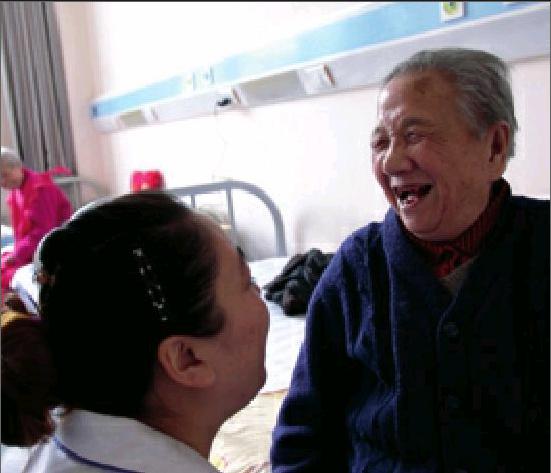Leaving in Peace
2014-06-17ByYuanYuan
By+Yuan+Yuan

Li Wei starts all of his college lectures with the same statement, “I have good news for you. You will die in less than 20,000 days.”
As the founder and president of Chinas first palliative care facility—the Songtang Hospice in Beijing—Li has worked in terminal care for almost 30 years. Death, a taboo subject in China, is something he comes face to face with on a daily basis.
“Normally the students are shocked to hear this. It seems that they never thought about death at their age,” Li said.
Lis figure 20,000 comes from the average life span in China, which was 75 in 2013. “We place too much importance on birth but avoid talking about death,” Li said. “This creates an illusion that we have plenty of time.”
Social womb
In 1987, Li founded the Songtang Hospice, which had only six beds when it first opened.
The first resident of Songtang was one of Lis neighbors, who was suffering from breast cancer.
“Her family members were all busy at work and couldnt spare enough time to take care of her,” Li recalled. “Coming to the hospice was their last resort but I finally convinced them to give it a try.”
It turned out to be the right decision for the family. Li was able to keep his dying neighbor company and take care of her during her last days. Her family were thankful for Li and the help he provided.
“Tradition would have us keep family members at home, especially our elders,” Li said. “If an old person is sent to a hospice, his or her children will be scolded as not being filial enough, which is a very serious accusation in China. As China becomes an aging society, relying only on young people for looking after seniors is not realistic.”
For Zhu Lin, Vice President of Songtang, a hospice is not a hospital, nor a care home. It combines the functions of the two.
“A hospice provides both medical and psychological support to alleviate the suffering of its residents and 24-hour care is provided by medical staff in addition to this,” Zhu said.
Since the 1990s, Li began his academic studies on the subject of terminal care. After collecting hundreds of cases from Songtang and several hospitals, Li concluded that the average length of time left after a person contracts a terminal illness is 280 days.
“I was surprised to find this result was so similar to the length of time a child spends in the womb before birth,” said Li, who developed the concept of the “social womb” based on his research.
“Before we are born, we stay in our mothers womb. Before we pass away, we need to stay in the womb of society. Society needs to take care of the terminally ill,” Li said.
For Dong Wei, the head nurse at the Songtang Hospice, she sees seniors as like children and the hospice like a kindergarten.
“The hospice cares for several hundred people, either seniors or people with a terminal illness,” said Dong. “Every day I go to every ward and say hello to everyone. If I arrive late or dont show up, some of the residents will get angry and refuse to talk to me until I apologize.”
Dong has worked in Songtang for more than 10 years. For her, the job is very emotionally demanding, but also rewarding. “The average age of the residents here is about 84,” Dong said. “Each of them is like a history book, recording Chinas history for the past 80 or 90 years.”
“Oh my God, you look so pretty today!”Dong often greets an old lady surnamed Wang in this way, going on to ask her, “How old are you?”
“I am 18! And I will be 17 next year!” Wang replied with a big smile, bearing a single tooth.
A 93-year-old woman surnamed Jin has been at the hospice for several years. She comes from a noble family in the Qing Dynasty (1644-1911). Every time when Dong or volunteers visit her, they bow to her as would have been courteous during the Qing Dynasty. No matter how unhappy she was, the woman always cheered up after the bow, according to Dong.
“I love them so much,” Dong said. “What they need is company. They spent their prime working hard and left almost everything to their children. The support they need is more psychological than financial.”
A 65-year-old man surnamed Wang has stayed at Songtang for more than a year. He was a team leader before retirement but being unable to work made him distant and unresponsive. He used to stare at the wall in silence. Dong and her coworkers decided to give him some work to do.
“We told him that we need help and asked whether he could organize some activities. We even gave him the title of ‘director,” Dong said.
The “job” helped the man feel reinvigorated. “He becomes talkative and his face glows with a smile all the time,” Dong said. “Retirement makes some seniors feel they are useless to society. We need to help them regain their confidence.”
From young to old
Huang Lei, a student from Tsinghua University, is a volunteer at Songtang.
Huang started her volunteer work with her teammates here in 2011 and has been coming ever since. Every Saturday, the volunteers visit Songtang and talk with the residents for hours.

“The first time my classmates and I went in 2011, we talked a lot about what we thought it would be like on the way there, but after visiting it, almost everybody was silent on the way back,” Huang said. “At our age, few of us have experienced death of close relatives, but at the hospice, we are close to death and it really put things into perspective.”
In 2013, Huang and her teammates started a program to help Songtang residents make their dreams come true.
The idea started with a female resident surnamed Qi. “During a visit in 2013, Qi told us that she wanted to listen to Pingju Opera, a form of local opera in north China, so we downloaded some arias and played them to her the next time we visited there,” Huang said. “It was a very easy thing to do, but it made Qi very happy. So why dont we do the same thing for the other seniors?”
The volunteers then started to ask the senior residents about what they want the most.“Their dreams are mostly out of my expectations,” Huang said. “Quite a few couples hoped to have a wedding ceremony and a lady who speaks fluent English even asked to hold an English press conference.”
So far, Huang and her teammates have helped 14 seniors to achieve their dreams. They held three wedding ceremonies, an English press conference and a concert.
“When some expressed their desire to sing songs, we thought that as volunteers we could simply play the music and sing along with them but it finally became a concert,” Huang said.
The concert was held on October 19, 2013. More than 40 volunteers from different universities gathered in the lobby of Songtang, which was decorated with red balloons and giant posters for the two performers—Sun Junge and Nan Xiaoyi.
Unexpectedly, in the middle of the concert, some other seniors were not content just sitting there as the audience and demanded to be allowed on stage to perform too. Finally, it became something of an impromptu talent show.
Two old ladies also took part. Jin, 93, sang Peking Opera, and Lyu, a former teacher from Beijing Jingshan School who is over 80 years old, read four poems. People applauded and argued over whose performance was better.
“We were excited to see them so happy,” Li said. “We frequently hold various activities that almost everybody can participate in so long as they can move. It is a good way to get them to be cheerful and activated.”
Of course it is not joyful all the time at the hospice. A few months after the concert, Lyu passed away.
“Hours before she passed away, she held my hand and asked me: Could you please stay with me a little longer?” Dong recalled, tears rolling down her cheeks.
Dong heard a similar story from Jin once when she visited her ward. “She stared at me and said, ‘I feel lonely, will you stay with me forever?”
“Every time I hear something like this, I want to cry,” Dong noted. “But we have to face it all the time in the hospice.”
“My volunteer work here has made me think about death frequently,” Huang said. In 2012, Huangs grandpa passed away and she was able to face it in a relatively peaceful way.
“Death is almost the only thing that you can be sure about in life, it is the final destination for everybody,” Huang said. “In order to say farewell to the world calmly, we need to live full of our present life and leave as regretless as possible.”
